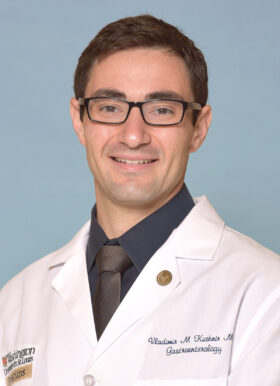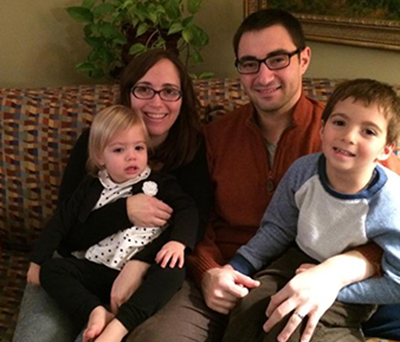Vladimir Kushnir, MD

Vladimir Kushnir, MD is a specialist in gastroenterology, interventional endoscopy and gastrointestinal oncology. He also has an interest in endoscopic therapy for obesity.
Dr. Kushnir sees patients at:
- The Center for Advanced Medicine, Gastrointestinal Center, 4921 Parkview Place, 8th floor, Suite C, St. Louis, MO 63110.
- Barnes-Jewish West County Hospital, Medical Building Two, 10 Barnes West Drive, Suite 200, St. Louis, MO 63141.
- Barnes-Jewish West County Hospital, Medical Building Three, 1020 N. Mason, Suite 100, St. Louis, MO 63141.
Please call 314-747-9843 for an appointment.
What happened in the course of schooling to influence you to choose your specialty?
When I began medical school, I wasn’t entirely sure what I wanted to do. I was interested in surgery, but also internal medicine. I discovered that gastroenterology, and specifically therapeutic endoscopy, was a good merger of the two specialties.
I liked that gastroenterologists are able to treat a breadth of disease processes in a very diverse patient population, from pediatrics to older adults. This is unique among specialties.
Did you always know you wanted to be a doctor?
There was always a strong medical presence in my family – my grandmother was a pediatrician and I always considered medicine to be a career option, but I didn’t firmly decide to go into medicine until I was a junior in college.
What brought you to Washington University?
My wife and I met in medical school and “couples matched” to come to St. Louis for our residency in 2006. She went to St. Louis Children’s Hospital, I came to Washington University – and I have never left. I’ve been on faculty here since 2013.

Which aspect of your practice is most interesting?
I find every patient interesting and important. I like that I am able to to offer minimally invasive therapy and in a lot of cases, help patients avoid surgery or invasive diagnostic testing.
We have also started our bariatric endoscopy practice — which is an emerging field in gastroenterology and the treatment of obesity.
As you know, there is an obesity epidemic in this country, as well as the entire Western world. Surgery has proven to be the best treatment for patients who are severely obese – those who have a body mass index (BMI) over 40. But surgery is also fairly invasive and in many cases, is irreversible.
There are newer endoscopic devices such as intragastric balloons and other emerging technologies such as intestinal liners. These are minimally invasive weight loss techniques and are reversible.
In the case of gastric balloons – a balloon is placed endoscopically in the stomach and inflated with saline. The balloon occupies space in the stomach and this allows patients to feel full – they eat less and lose weight. Also, because the food leaves the stomach slower, it prolongs that sense of fullness between meals.
The balloons are used as weight-loss tools along with education in lifestyle changes. After six months, the balloon is removed and because patients have learned healthy living habits along with adjusting their lifestyles, they are able to maintain long-term weight loss.
Right now, over 90% of patients who qualify for weight loss surgery are unwilling or unable to undergo surgery – for a variety of reasons. They might be afraid of complications or cost might be a deciding factor.
Endoscopic procedures offer an avenue for these patients to achieve weight loss. From a technology standpoint, there is a lot of innovation. I am very excited about the future of our endoscopic weight loss program.
Does a patient have to be referred to you by another physician?
Because the endoscopic intragastric balloon procedures are not covered by insurance, a patient does not have to be referred by his or her physician.
Patients are welcome to attend free information sessions at Barnes-Jewish West County Hospital to determine if this procedure is right for them.
Who are the best candidates for balloon therapy?
The ideal candidate has a Body Mass Index (BMI) between 30 and 40, who wants to achieve 15% total body weight loss.
Are there any other new developments in your field?
The bulk of my practice is therapeutic endoscopy – my colleagues and I specialize in removing precancerous polyps endoscopically during the colonoscopy. We are also able to remove large polyps that as recently as 10 years ago would have been removed surgically.
We treat patients with either precancerous or cancerous conditions of the GI tract, as well as the pancreas and biliary tree.
That involves endoscopic procedures to unblock bile ducts if they are blocked by a tumor, removing precancerous polyps throughout the intestinal tract, and treating patients with pancreatitis and gall stone disease by endoscopic means.
I also specialize in treating precancerous conditions of the esophagus – problems with swallowing.
Down the road, do you see a better prep for colonoscopy?
The question is how long we will keep doing colonoscopies? For patients who are at risk for colon cancer, a colonoscopy is still going to be the gold standard for screening and prevention of colon cancer.
In 10 to 15 years, not everyone will need a colonoscopy at age 50. The future of colon cancer screening will include a non-invasive stool-based DNA test that looks for the presence of precancerous polyps. If these DNA test results indicate precancerous polyps, a colonoscopy would still be critical to finding the lesion or lesions and removing them.
Patients who are low-risk for cancer would periodically have stool based non-invasive testing. But we are not there yet.
On the subject of bowel prep – the prep has improved as recently as three or four years ago. There is less volume to drink and it tastes better than it used to.
Where are you from?
I am originally from the Ukraine – my family immigrated to Utah in 1991 when I was 10 years old. I grew up in Utah, went to college at University of Utah and medical school at The Ohio State University.
My parents still live in Utah. My mother was a teacher by training, but she is now a lab technician and my dad is a research chemist. I think I’m the fourth generation of scientists in my family.
Do you speak Russian?
Yes, I do. There is a good size Russian speaking population in St. Louis and I see a fair number of Russian patients – probably one or two a month.
Is there a particular award or achievement that is most gratifying?
My most gratifying achievements are my journey here and my family.
What is the best advice you’ve received?
Surround yourself with good people. Believe in yourself. And hire well!
If you weren’t a doctor, what would you like to be doing?
I would probably go into business or be an engineer.